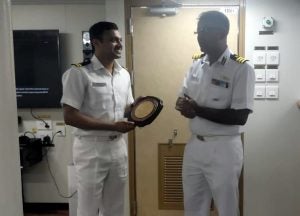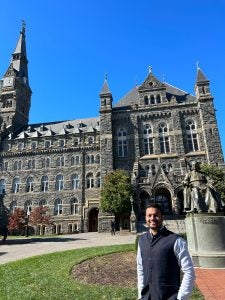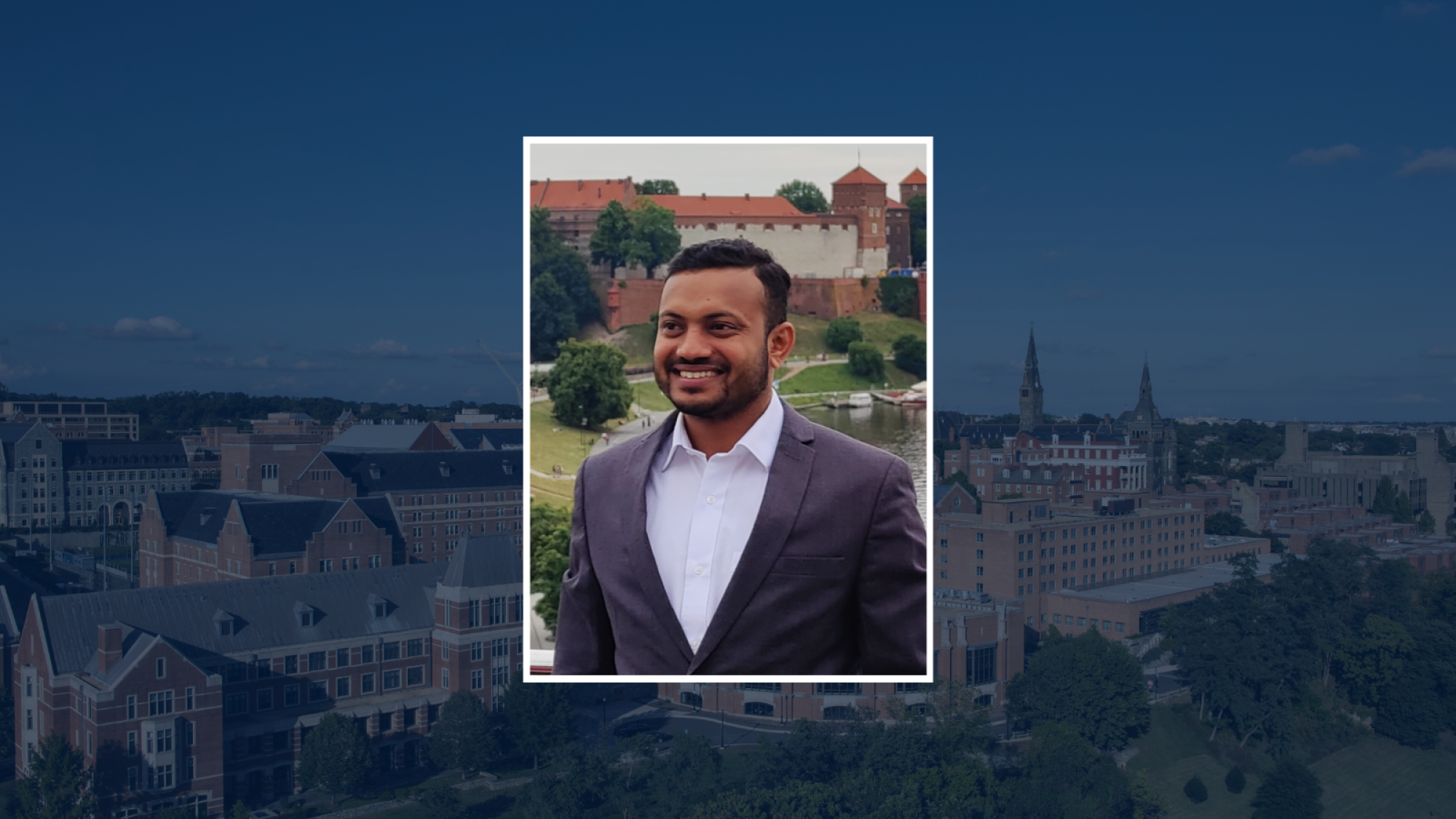Saurabh Bhoyar (MSFS’25) came to Georgetown after serving four years in the Indian Coast Guard and two years in the Indian Defense Innovation Organization. He joined the Master of Science in Foreign Service program looking to leverage his technology and security background to advance community development. He never would have imagined, however, that he would discover a new passion for environmental justice and energy security along the way.
Foundations in Security and Technology
Bhoyar has always wanted to serve his community. Growing up in the small town of Dongargarh in Central India instilled this passion in him from an early age, as he witnessed first-hand the direct impact of lack of resources on education.
“I grew up in an ecosystem where we didn’t have so much exposure and resources available to us as a society. I always wanted to contribute to community development,” he says. “How could I make the life of my community and the lives of the citizens better around me?”
Traveling 1,000 km from his hometown, Bhoyar pursued a bachelor’s degree in mechanical engineering but was searching for ways to channel his academic and technical background for the greater good. After finishing his program in 2015 and completing a rigorous application process, he was accepted to join the Indian Coast Guard, an institution with a reputation for being innovative and technologically advanced.

Not only did his naval training shape his personality, but Bhoyar shares that it also helped form his worldview. Training alongside foreign naval officers from Sri Lanka, Myanmar and Kenya further cemented his newfound understanding of global affairs.
“I realized the value and importance of solidarity and global cooperation to resolve conflicts and to help each other progress,” he says.
He served for four years in the commissioned rank of assistant commandant in the Indian Coast Guard, primarily posted in the city of Visakhapatnam in east India but regularly sailing all around Indian coastal cities and across international waters.
After leaving the military in 2019, Bhoyar interned at the World Youth Alliance, a U.N.-affiliated organization in the Philippines. In 2021, he found his way back to the Indian Ministry of Defense where he had the opportunity to work on a range of innovative projects, including artificial intelligence, machine learning, satellite imaging and computer vision.
A New Passion for Service and the Environment
Towards the end of his stint with the Indian Ministry of Defense, Bhoyar was feeling inspired to embark on another international experience, this time in academia. A U.S. foreign service officer pointed him towards MSFS, so when he arrived on the Hilltop in 2023 to begin the program, choosing his concentration in science, technology and international affairs (STIA) was a natural selection, based on his experience.
“Because I came with seven years of practical professional exposure, I thought I knew something about the industry and global affairs,” Bhoyar says. “So I came with a very clear direction of thinking that this is what I would like to learn, and this is the probable path that I would like to take after my program.”

However, he shares that his perspectives have been challenged and changed over the course of the program. A pivotal moment came during his Gateway course, Science Policy Matters, taught by Professor Theresa Sabonis-Helf. This class introduced him to various spheres of science policy, including health, AI, security and defense, as well as environmental perspectives.
“The class sparked a deeper understanding and made me realize the urgent need to redirect resources toward the climate and energy domain. This realization shaped my decision to dedicate the remainder of my degree to studying energy and climate policies in depth,” Bhoyar says.
Looking Ahead to Innovation and Policy Making
Halfway through his second year in MSFS, Bhoyar is starting to tie these threads of his personal narrative together. He reflects on how his humble upbringing as well as multi-continental academic and professional experiences have shaped his theory of change.
“Social and sustainable innovation can solve multifarious interlinked socioeconomic challenges, enhance trade between communities and foster cooperation and interdependence,” he says. “This ultimately reduces the likelihood of future conflicts and contributes to peace and equitable development.”
Bhoyar wants to channel this new outlook into a career in energy and climate innovation and policy making. This summer, he will participate in the Ashoka-Environmental Defense Fund Climate Corps Fellowship, a three-month program where he will be paired with organizations across private and public sectors dedicated to meeting climate goals and strengthening the Indian economy. After that, he would love to work for an international development organization, such as the Asian Development Bank or the International Energy Agency.
Coming back to his beginnings in the Indian Coast Guard, he encourages fellow veterans returning to civilian life and higher education to dig in and take full advantage of the new networks and exposures that come with the university ecosystem.
“I would encourage them to be open-minded and welcoming to the ideas and opportunities in graduate school like at Georgetown. The world is rapidly changing, and the skill set that we acquire as veterans in any armed forces is transferable to any other industry, which is what I’m trying to do in the energy and climate space.”
